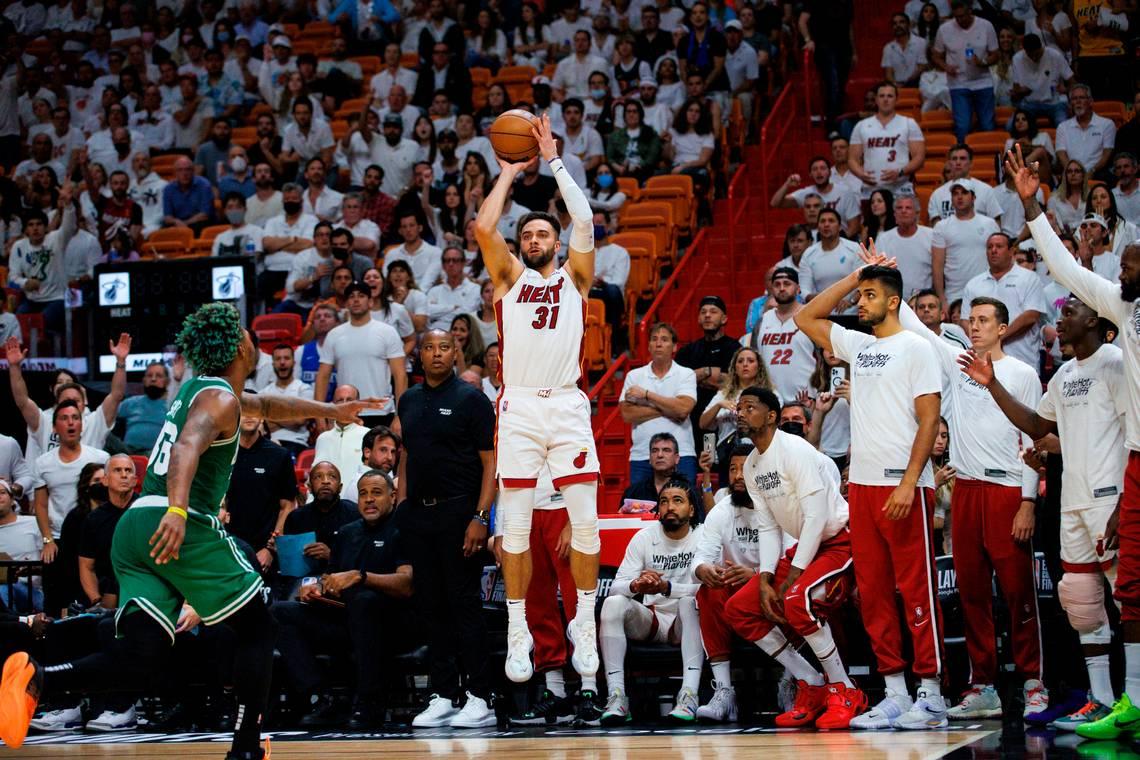
One of the costliest moments for the Miami Heat in its season-ending, 100-96 loss to the Boston Celtics on Sunday happened in Secaucus, New Jersey.
With 8:28 left in the third quarter of Game 7 of the Eastern Conference finals, three points came off the board for the Heat and the Celtics’ lead — once apparently down to 56-54 — swelled to 67-54 with two free throws by Robert Williams. A few minutes after Max Strus hit a three-pointer to seemingly cut Boston’s lead to 56-54 with 11:04 left in the third, an official in Secaucus, where the NBA Replay Center is headquartered, decided it shouldn’t count. A replay, the NBA said, showed the wing stepped out of bounds before hoisting his long-range jump shot in Miami.
Erik Spoelstra said he was “in shock” at the ruling.
“The fact that it happened 3-4, five minutes in game time — that does change the context of how you’re playing. We were starting to gain some momentum,” the coach said. “You feel like it’s a seven-, eight-point game and you look up and it’s a 13-point game, and there’s no other explanation for it other than, It’s gone back to the league offices. You feel like if it happens like that, it should happen immediately and you can adjust accordingly.”
In a tight game with the a trip to the 2022 NBA Finals on the line, the call was significant and, in a sense, the difference in the game. With 50.7 seconds left in the fourth quarter, Strus made another three to slice the Celtics’ lead to 98-96. Boston won by five and scored its final two points after the Heat intentionally fouled with 11.4 seconds remaining.
The call itself was controversial, too, and not just because of the delayed decision to overturn the shot. Replays made available on the ESPN broadcast seemingly never provided conclusive evidence Strus actually stepped out of bounds, with his left heel potentially hovering over the sideline.
It is possible the NBA had access to additional angles not showed on the broadcast or inside FTX Arena.
“Look, that’s not the reason we lost,” Spoelstra said. “We still had plenty of opportunities. We just couldn’t get control of the game.”
Miami still had a shot to win in the final minute. With 16.6 seconds left, All-Star forward Jimmy Butler got an open look at a pull-up three from the right wing, only to have his potential game-winning shot bounce off the front of the rim.
Even though Spoelstra didn’t want to use the overturned call as an excuse, he would like to see the NBA reexamine this rule and how long after the fact officials are allowed to overturn calls.
In this case, officials overturned the call 2:36 later in game time and 5:11 later in real time. The Celtics went on an 11-3 run after the Strus play and it effectively became an 11-0 run after the three points were taken away.
The NBA decided to review the play to check whether Strus stepped on the three-point line. Once a replay is triggered, officials are allowed to check for additional, cut-and-dry infractions, such as stepping out bounds. The league cannot, however, initiate a replay to check whether a player stepped out of bounds, which is what made this ruling somewhat unusual.
Checking whether player stepped out on a shot can’t trigger review, but the review happened because they wanted to check if Strus’ shot was a 2 or 3-pointer.
With 2 or 3-pointer question triggering review, replay center can also then check to see if player stepped out on shot. https://t.co/dYSPLH6G3u
— Anthony Chiang (@Anthony_Chiang) May 30, 2022
“I‘m sure they will look at that, and we’ll probably be the case study for it. I’m OK if it happens the way it used to. They would look at it at the next foul or break, and look at it and notice it, but it was probably ten minutes of real time,” Spoelstra said. “I’m not crying or whining. Come on. We got beat. That was two competitive teams going at it. We had a crack at it at the end. Even as uneven as the game seemed, we had a crack at it … but that was so unusual for us to be grinding and then to start to get some momentum, and then it was like, Oh, hey, by the way, take away that three, with no explanation.
“That’s the human side of it. That’s not the complaining side of it. Who knows if that would’ve changed anything, anyway?”
